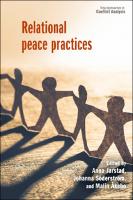Relational peace practices
Contributor(s)
Jarstad, Anna (editor)
Söderström, Johanna (editor)
Åkebo, Malin (editor)
Language
EnglishAbstract
This book contributes to scholarly debates about what peace is and how it can be studied by developing a novel framework and tools for studying peace as relational. Drawing primarily on peace and conflict research and sociology, it defines relational peace as entailing non-domination, deliberation, and cooperation between actors in a dyad, that the actors recognize and trust each other, and that they conceive their relationship as one between fellows or friends. The book provides tools for empirical studies of relational peace and applies the framework in several sites: Cyprus, Cambodia, South Africa, Abkhazia, Transnistria/Russia, Colombia, Sri Lanka, the Philippines, and Myanmar. It shows how the framework can be applied across cases, actors, geographical locations, levels of analysis, types of data, and stages of peace processes. The book offers guidance on how to use the framework empirically with a variety of methods. Each case study in the book also makes unique contributions to specific literatures, such as civil
Keywords
deliberation; cooperation; non-domination; trust; recognition; friendship; processual; practice; actor-centric; web of relationsDOI
10.7765/9781526168979ISBN
9781526168979, 9781526168979Publisher
Manchester University PressPublisher website
https://manchesteruniversitypress.co.uk/Publication date and place
Manchester, 2023Classification
Peace studies and conflict resolution
International relations
Comparative politics


 Download
Download Web Shop
Web Shop